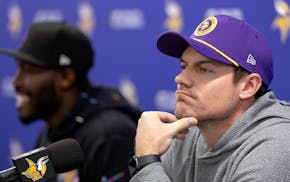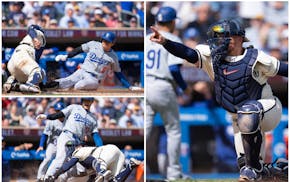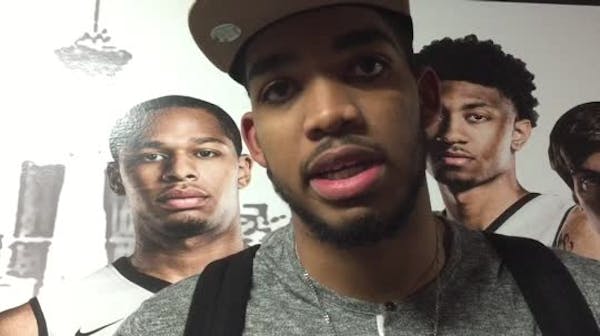Kevin Garnett's return to the Timberwolves has long been a foregone conclusion, even with his disappearance last season.
News of his new $8 million salary brought some sticker shock, though.
The Wolves signed off on a two-year, $16 million contract for a 39-year-old who played only five games in his return to town and has grinded out more than 55,000 minutes of NBA basketball.
Like others, my initial reaction was, $8 million a year? Seriously?
At first blush, that pact seems foolhardy. Garnett is bound for the Hall of Fame, but his on-court production doesn't match that dollar figure at this stage of his career.
This represents a legacy deal as much as anything, a nod to Garnett's career achievement and his status as the longtime flag bearer of the organization.
Upon deeper reflection, Garnett's contract brought me to a different conclusion.
So what?
The size of his paycheck is largely insignificant since it doesn't put the Wolves in a dicey salary-cap, luxury-tax predicament. He's not causing a financial crunch.
Plus, the Wolves weren't in the market for another established free agent who would command a high(er) salary and meaningful playing time that might impede the development of others.
The team's directive continues to revolve around the core of young talent. They're not contenders yet. The rebuild remains a step-by-step process.
If his knees and legs don't fail him — the one obvious unknown in this discussion — Garnett still could leave a tangible imprint in his second stint, and not just at the box office.
That marketing ploy has been mostly exhausted. The team's season-ticket campaign tied to Garnett's return last season left a bad taste once he faded into the background after that initial euphoria.
The guess here is that Garnett's notable absence down the stretch became two-pronged: 1) To preserve his health in a lost season, and 2) Tank for Towns.
Garnett's re-signing last week shouldn't be confused anymore with the need to romanticize his best years. The interest of Wolves fans now belongs to the future and the organization's new faces — Andrew Wiggins, Karl-Anthony Towns, Zach LaVine, Tyus Jones, Shabazz Muhammad and European Nemanja Bjelica.
This is their team now.
In the worst case, Garnett's body breaks down and he turns to his ownership pursuit after the season.
In the best case, he provides a mini-version of the production/leadership value that Torii Hunter has brought to the organization that resides across the street in downtown Minneapolis.
Even though Flip Saunders talks optimistically about Garnett's health, it's unrealistic to expect him to duplicate Hunter's on-field performance. Different sports, different situations.
Garnett's most important contribution can come on defense and his ability to impart his defensive acumen on the Wolves' cast of young post players. A pick-and-roll role model, if you will.
Garnett still defends like a pit bull guarding his turf. He just can't stay on the floor for long stretches or be counted on to play 82 games. But he has a lot of expertise to share. His knowledge of defense and of basketball overall has the potential to benefit Towns, Adreian Payne, Gorgui Dieng and Bjelica in particular.
The notion of veterans acting as mentors has become rather clichéd in sports. Many media members, myself included, promote that nebulous angle too often knowing there's no concrete way to substantiate it. Or quantify it.
In some cases, the relationship yields positive results. Sometimes the needle barely moves.
Hunter clearly has made a positive impression on the Twins clubhouse, whether that's encouraging young players to study more video of pitchers or orchestrating a postgame dance party to lighten the mood.
The Wolves are counting on Garnett to do likewise. The dance party is optional. Defense is not.
The Wolves were the worst defensive team in the NBA last season. They finished last in the league in scoring defense, last in field-goal percentage defense and last in opponents' shooting percentage from inside 5 feet.
Fixing his defense has become Saunders' top priority. A starting front line of Garnett, Towns and Wiggins represents a significant upgrade in that department.
This all presupposes that Garnett stays healthy and can be counted on with regularity in his 21st season. The Wolves certainly paid him well enough with that plan in mind.
Chip Scoggins • chip.scoggins@startribune.com

Scoggins: Worried about costly trade to draft a quarterback? Don't be.
Scoggins: 'Wait one more year' can't be the Wild's plan. Thankfully, it isn't.

Scoggins: Finch feeling heat of the Suns as playoff battle looms
Scoggins: Why 'championship or bust' fits these Wolves


